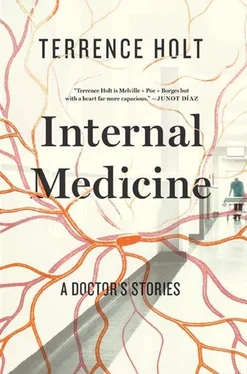The house itself might have been deserted. From somewhere out back rose a strangled cry — for a brief moment it seemed the sound of someone calling for help, and then I realized it was a parrot. It called again.
“Bah!” it seemed to say. Then, more clearly, “Bad!”
Linda looked at me. “Do you think that’s one of the church ladies?”
“Bad!” the bird called again. “Bad! Bad!” Linda’s joke, and the repeated screeching, combined to set my skin crawling: I thought of a small, angry old woman crammed into a wooden hutch, screaming.
“Listen,” she said, cocking her head.
“Bad bird!” the parrot called. Then, after a pause that stretched out as if in contemplation, “Go to hell!”
Linda burst out laughing. “Who trains a bird to talk like that?”
Charles Turner was waiting in the doorway, looking slightly embarrassed. “You heard that,” he said.
“What, the bird?” Linda laughed again. “Hard to miss it.”
He smiled weakly. “Sometimes we get calls from the neighbors.” He glanced back over his shoulder.
“Just let the bird tell them to go to Hell,” Linda suggested brightly.
“He’s not the one the neighbors complain about.” Shaking his head, he led us down the hall.
“What do you suppose the other birds say?” Linda whispered to me. By the time we had made our way through the darkened dining room, I realized I was hunching my shoulders, prepared to fend off a verbal assault. But no more sound came from the back of the house.
In the bedroom, Sylvia Turner sat propped up on pillows. The mask fluttered, puffing out a series of nonsense sounds.
I had a chilly moment wrestling with the possibility that the words really were nonsense, Mrs. Turner driven mad by whatever the church ladies had said. Then Linda started to laugh.
“You didn’t teach him that?”
Mrs. Turner rolled her eyes heavenward.
Her husband, still standing at our backs, said quickly, “Lord, no. They’re rescued birds. They came that way.”
Another burst of sound from Mrs. Turner — a string of vowels, low and flat.
Linda laughed again, but though I listened closely to the mangled words I couldn’t put them together.
Shaking off a sadness that irritated me for being ungrounded in anything I could name, I moved to the bedside opposite Linda.
“Mrs. Turner?”
The mask turned toward me. The eyes were unreadable. Had I interrupted? Off in the distance, a bird was croaking something about a pretty girl.
“We heard you had some trouble yesterday.” I said this as gently as I could, but still it felt like I was pushing something faster than it wanted to go. I was anxious, I realized, to get out of there.
And while I was trying to penetrate the jungle that had grown up in my own motivations, the woman on the bed started to cry.
It took me a while to recognize this. What I saw, from my perspective, was initially obscure. The face above the mask simply crumpled, withdrew, eyes squeezed tight. Then, after a sharp intake of breath, the mask plastered itself against the lower half of her face: as it clung there, it showed for a distinct instant the outline of a crater far too large to belong in any human face. It reminded me of the plaster casts archaeologists make of the voids left where something has crumbled into rust. Then the mask bulged out again on a gust of inarticulate woe. The face turned away from me, burying itself in the pillow, where, twice muffled in cancer and down, it sobbed. I watched her shoulders heave, how clearly the bones slid beneath skin. This woman is starving, I thought.
Linda’s hand appeared, stroking the lank hair. A movement at my elbow caught my eye, and I gave way to Turner as he bent over the bed. He was muttering something I could not catch beyond a tone of barely contained rage. At me? I wondered momentarily. In the distance, a parrot uttered an obscenity. Turner glanced up in that direction, straightened, and in a very low voice repeated it. The room fell still, the word rolling through the stillness like thunder far away. From the pillow, muffled but clear, the voice spoke what it could of the man’s first name, a short a cut off at either end, but the tenderness and the mild reproof were clear enough.
The big man glanced around sheepishly. “I’m sorry, Sylvie,” he said.
She straightened, but kept her gaze to herself as she tugged at her hair; some wisps had stuck to the fabric of the mask, held there by the tears that had soaked into it. She pulled the hairs away, composed herself, smoothing the spread. “A,” she said again calmly, and then something more. Turner’s face clouded again.
“They can too help themselves, Sylvie. They just don’t want to. They—” He broke off. “They’re just vultures,” he growled, and fell silent again.
Sylvia rolled her eyes. The gesture looked very odd from where I stood: without a face to support it, the expression lost its moorings, as if her eyes had gotten free from their sockets and in the next moment might fall onto the pillow. She closed them briefly, as if drawing them back in. When she spoke again the tone was a determined contradiction.
Turner snorted. “ ‘Christian,’ my eye.”
Sylvia nodded emphatically.
“What has ‘Christian’ done for us lately?” Turner snarled, turning away.
For a long moment, Sylvia’s gaze lay inscrutably on her husband’s back, and then the head turned back to the pillow, and from its depths came again the sound of muffled sobs.
This time they did not subside. As none of us said a word they began to rise in pitch and volume. From the distance a bird took up the cry, inarticulate screeching now. Another joined in. The birds sounded distressed — or was the tone, too, only mockery? The crying on the bed grew louder, one clawed hand reached out, clenched the pillow, withdrew, formed a fist, and began pounding on the bed. With each blow the cries grew louder, higher, and from the end of the house the screeches of agitated birds came back — echoes, I kept imagining, of Hell. Harpies, I was thinking. Or was it Furies? I couldn’t remember which was which, I realized, as the shadows of Linda and Mr. Turner moved in, hovering over the bed.
SOME TIME LATER, after the Ativan had done its work and Sylvia had subsided into sleep, the three of us sat around the dining table. Linda had been trying to think of some means of fending off the church ladies. The hospice chaplain, she thought, could call them. Turner had refused, shaking the suggestion off as a horse shies flies. In the awkward pause that followed, Linda pointed at the wall.
“Is that you?” she asked. It was clear she was trying to change the subject, giving Turner a ladder out of the dark hole he had dug himself into.
Turner looked up, laughed bashfully. “Yeah.”
Linda let out a bright peal. “Did you pose for that?”
Turner shook his head emphatically. He was coloring up to his receding hairline. I turned and craned my neck. It was clear which of the canvases she meant: a large oil of a muscular male nude standing in a hubcap emerging from the sea. Hovering at the figure’s shoulders, a pair of scarlet macaws clutched in their beaks the ends of a long leather tool belt, which looped between them in front of the figure, obscuring its genitals but little else. The figure gazed modestly toward the shallows; in the air above it, flights of cockatoos flushed pink in the sunrise.
We all gazed at it for a while.
“She loved to paint,” Turner said quietly.
“Yes,” Linda said. “I can see that.”
Turner brightened. “It shows, doesn’t it? How she just loved it? And the birds—” He twisted away. “She loved everything.” There was a long silence. I could hear a faint metallic twanging from the back of the house. When he spoke again his voice was barely audible. “She used to love everything,” he said.
Читать дальше












